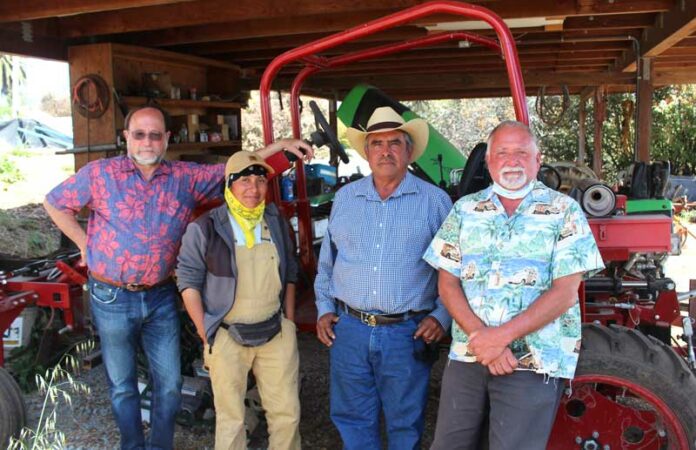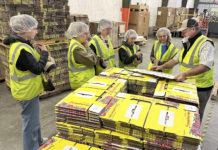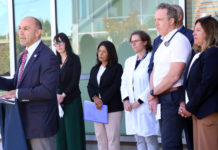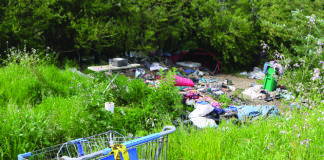
In 2021, biotech company Blume Industries (BI) and Whiskey Hill Farms (WHF) became recipients of The Farmer Rancher Grant, a major grant from the U.S. Department of Agriculture’s (USDA) Western Division of Sustainable Agriculture Research and Education (SARE).
The grant aims to support farmers and ranchers who are striving for sustainability; since 2009, BI and WHF have jointly operated an incubator facility in Watsonville, looking for regenerative solutions for food, fuel and waste management.
Now, one year later, they have received yet another SARE grant, this one for $99,800, to support their ongoing farmer education project. The project’s goal is to offer a training curriculum for agricultural professionals, teaching small farmers about closed-loop and regenerative techniques, sustainable conservation, cost-saving measures and more.
“The USDA gets many grant requests,” said David Blume, CEO and director of resource and development at BI/WHF. “But now that we’re repeatedly getting grants from them, it’s clear that they value what we do here. Otherwise, we’d just be one little organization lost in the flood.”
Two years ago, the Sustainable Systems Research Foundation (SSRF), a nonprofit “think tank” in Santa Cruz aiming to address environmental and sustainability issues, visited WHF and became interested in working with them.
“We were blown away at what they were doing,” said Ronnie Lipschutz, co-director of SSRF. “There’s a lot of technique at work here, that is regenerative and closed-looped. We were really impressed.”
In addition to the SARE grant, Lipschutz reported that the project has also received a grant for $10,000 from the UC Sustainable Agriculture Program based at UC Davis, which will help them continue their series of workshops with local farmers.
One farmer is Filemon Regalado, who runs a small family farm and works at Ibarra Farm in Gilroy, where he has been implementing what he has learned at the workshops. Regalado explained through a Spanish interpreter his experience.
“From the time that I’ve had here, I’ve learned how to manage the compost they do with the wood chips,” he said. “I really like everything I’ve seen, with the greenhouses and hoop houses … I already have four that I’m getting started. I’m growing zucchini, okra, basil, and tomatoes.”
Regalado said he has noticed the quality of his soil and produce increase. In addition, less labor is required to grow, and there is less waste produced. He also appreciates the relationships that have formed during the workshops.
“That’s another thing I’ve really appreciated about the series: the networking, and the people that we’ve met,” he said. “I’ve learned so much.”
Celsa Ortega, who runs Induchucuiti Organic Farms, agreed.
“The fact that the people who have come and presented, have such a good track record and are doing so well, that’s inspiring,” Ortega said, also through the interpreter. “I was very shy at the beginning … But this has helped me to open up and be comfortable socializing. And at the end of the day, maybe we all have similar questions. Learning those best practices and implementing them on my own farm is something I’ve really appreciated.”
Ortega runs her farm almost single-handedly, prepping the soil, making the beds, planting–even the accounting. The workshops have given her a chance to feel supported when facing challenges, from the ongoing drought to making a sustainable profit.
“This is only my third year in agriculture,” she said. “I’ve been a farmworker, but now that I’m a farmer, I’m facing many different challenges. I need to learn many different things on how to handle the soil, nutrients, macro and micro … I would love to continue with these workshops. I’m learning a lot.”
There is more on the horizon for BI/WHF in the next year. Lipschutz and his team at SSRF have continued to send out grant requests, including one that could possibly bring students from Watsonville and Renaissance high schools to the workshops.
Blume said they also plan to construct a foundry, where farmers from the community can come to design and build their own agricultural tools.
And two weeks ago, they announced they will be offering a special course on July 4-9th, which will provide hands-on experience from Blume and other key instructors. The course will cover advanced regenerative methods and equipment, teaching participants how to produce renewable low-cost fuel, abundant food and organic fertilizers.
“Many farmers are secretive, thinking they have invented something new,” Blume said. “But farming is thousands of years old. There is nothing really ‘new.’ We all have things that somebody does better than someone else that we can learn from. That’s what we want to do.”
For information on the upcoming summer class email Tom Harvey at to*@**************ms.com.












